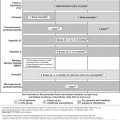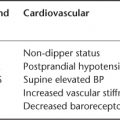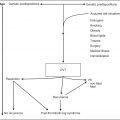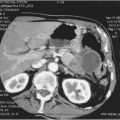Components of the geriatric assessment
| Dimension | Screening test | Assessment tests |
| Advanced directives | Do you have an advanced directive or living will? | Detailed discussion Document desires in chart Discuss ventilation separately from cardiac resuscitation Discuss feeding tube Discuss long-term beliefs if the person becomes cognitively impaired Assess the person’s ability to make appropriate decisions |
| Affective | Are you sad? | Geriatric Depression Scale |
| Alcohol abuse | Do you drink alcohol? | CAGE Michigan Alcohol Screening Test—9 |
| Blood pressure | In older persons all blood pressures need to be measured at a minimum of sitting and standing | Check for postural hypotension at one and 3 minutes after standing If the person falls, is dizzy, syncopal or has a stroke or myocardial infarction within 2 hours of a meal, check for postprandial hypotension Both orthostatis and postprandial hypotension are more common in the morning Because of arteriosclerotic occlusion of vessels older persons often have a higher blood pressure in one arm than the other. Always treat the higher blood pressure Arteriosclerosis can lead to pseudohypotension. This can be screened for by the Osler Manoeuvre but as it has poor sensitivity and specifically intra-arterial blood pressure may need to be obtained ‘White-coat’ hypertension is common so always obtain home blood pressures A wide pulse pressure has a poor prognosis in older persons |
| Caregiver burden | Is the caregiver having problems coping? | Geriatric Depression Scale Caregiver Burden Inventory, looks at time, developmental needs, social burden and emotional burden |
| Dehydration | How much fluid do you drink each day? | Check serum osmolality Remember elevated BUN to creatinine ratio occurs with renal failure, liver disease, heart failure and gastrointestinal bleeding |
| Delirium | Is the person confused? Does the level of confusion fluctuate? | Confusion Assessment methodology (acute onset, fluctuates, lack of attention, disorganized thinking including illusions, delusions and hallucinations; hyperalert or lethargic) |
| Dental | Do you have false teeth? Do you have sores in your mouth or gum disease? Do you often have bad breath? | DENTAL screening tool |
| Dizziness | Do you get dizzy or does your head spin around? | Check for postural hypotension Hallpike Manoeuvre for Benign Paroxysmal Positional Vertigo (BPPV) Haemoglobin Geriatric Depression Scale |
| Driving assessment | Do you drive? How do you meet your transportation needs? | If poor vision, cognition or motor function refer to a Driving Rehabilitation Specialist to test in either a driving simulator or on-road driving test. This may include monitoring driving when alone utilizing a GPS device. If this is refused. the physician needs to report the patient to the Department of Motor Vehicles as unsafe to drive |
| Economic | Do you have enough money to pay your bills and purchase medicines and food? | Health Insurance Medicare Part D Can a cheaper drug replace a more expensive one? |
| Fatigue | Are you easily exhausted (tired)? | Bioavailable testosterone (in males) C-reactive protein, haemoglobin, TSH and vitamin B12 Epworth Sleep Inventory for sleep apnoea Fried Frailty Test (see Chapter 113, Frailty) |
| Function | Do you need help at home? | Barthel Index Katz Activities of Daily Living (ADL) Lawton Instrumental Activities of Daily Living (IADL) More sophisticated testing includes giving a person a medicine bottle and asking them how they would take the medicines, opening and shutting a variety of small doors, putting beans in a tin can, putting on a jacket or buttoning a shirt Social Activities Inventory |
| Hearing | Do you have trouble hearing especially in a noisy environment? | Hearing Handicap Inventory for the Elderly Audioscope Remove wax Consider hearing frequency testing |
| Incontinence | Do you wet yourself? | Urine for cells and culture Does it occur when coughing, sneezing (stress) Do you get the urge to go and have to go immediately (urge) Urodynamics |
| Insomnia | Do you have trouble sleeping? Are you tired during the day? Does your partner say that you stop breathing when sleeping? | Full sleep history including daytime napping, pain at night, nocturia, time going to sleep and environment Consider overnight sleep test for sleep apnoea |
| Masked renal failure | Loss of muscle mass leads to normal serum creatinine levels in the face of severe renal failure | Use Cockcroft–Gault formula or measure serum cystatin-C |
| Memory | Do you have problems remembering anything or do any of your family or friends think you are having problems? | Saint Louis University/VA Mental Status Examination (SLUMS) If positive, TSH, vitamin B12 and homocysteine Consider MRI in some cases |
| Mobility/balance | Do you have trouble walking or lose your balance? Have you had a fall? Do you have a fear of falling? | Get up and go from a chair (may ask to do so holding a glass of water) Gait speed over 10 metres Stand on one foot with eyes open and shut Observe walking with a turn or dance with the patient. This should also be done while distracting the patient Measure stride length and variability |
| Nutrition | Have you lost weight? Height? Weight? Simplified Nutrition Assessment Questionnaire (SNAQ) | Body mass index Mini nutritional assessment Use ‘meals on wheels’ mnemonic to look for treatable causes |
| Osteoporosis |








